Following is the implementation of the IQueryable<T>.Except, check here :
public static IQueryable<TSource> Except<TSource>(this IQueryable<TSource> source1, IEnumerable<TSource> source2) {
if (source1 == null)
throw Error.ArgumentNull("source1");
if (source2 == null)
throw Error.ArgumentNull("source2");
return source1.Provider.CreateQuery<TSource>(
Expression.Call(
null,
GetMethodInfo(Queryable.Except, source1, source2),
new Expression[] { source1.Expression, GetSourceExpression(source2) }
));
}
Prime difference between the working of the IQueryable<T> and List<T>, Queryable type internally works with Expression<Func<T>>, since its getting executed remotely, in your case using the provider, when List<T> works with Func<T>, since its an in memory processing. When it comes to remote processing something like EF translates into relevant Sql query for processing, when in your case the following translates to null during remote processing: bs.Select(b => b.ToType()).
Following is the implementation of IEnumerable<T>.Except, check here:
public static IEnumerable<TSource> Except<TSource>(this IEnumerable<TSource> first,
IEnumerable<TSource> second)
{
if (first == null) throw Error.ArgumentNull("first");
if (second == null) throw Error.ArgumentNull("second");
return ExceptIterator<TSource>(first, second, null);
}
Except itself is internally a set operation, even for List<T> call to Except(null) will lead to same exception.
As you have seen the definition of the IQueryable<T>.Except, its important to understand the difference in processing of the Expression and Func, Expression is more about what to do and Func is about how to do check this.
For a simple var intList = new List<int>{1,2,3}, this is what Queryable expression looks like (as shown in the attached image).
Essence remains check what your provider is internally translating the Queryable Expression into, which is leading to null and thus exception while processing


ps2 = bs.Select(b => b.ToType());`, and what happens if you call `.ToList` on `ps2`? There are certainly limitations -- not so much in the expression tree (although there are such limits) -- but more what parts of the expression tree can be converted into SQL (or whatever the underlying data access language is). For example, EF6 against SQL Server will choke on a call to `.ToString`, because there is no simple way to translate that into SQL. But if that were the case ...
– Zev Spitz Jul 17 '18 at 23:10p1 = ps2.ToList()` works, and if I do `ps.Except(p1)` after that, it works.
– Kristen Hammack Jul 18 '18 at 21:11